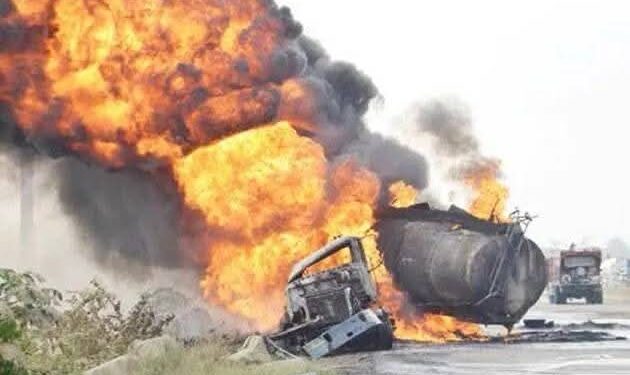By The Merit Newspaper
Fuel scooping from fallen tankers has become an alarming and tragic occurrence in Nigeria, with devastating consequences. This dangerous practice often ends in explosions, loss of lives, and destruction of property. The recent incident in Niger State, where individuals reportedly used a generator to aid in scooping fuel from a fallen tanker, underscores the dangerous mix of ignorance and poverty that fuels these disasters.
The Niger State Incident: A Preventable Tragedy
In January 2025, tragedy struck in Niger State when a fuel tanker fell, spilling its highly flammable cargo. Instead of maintaining a safe distance and alerting authorities, a group of individuals saw an opportunity to scoop the petroleum for personal gain. Shockingly, they used a generator to aid the process, oblivious to the fact that the fumes from the spilled fuel could ignite with even the smallest spark. Predictably, disaster followed—a massive explosion occurred, killing several people and leaving many others injured.
This incident highlights the perilous ignorance surrounding the dangers of fuel scooping and the desperate poverty that pushes individuals to risk their lives for a few liters of fuel.
Ignorance: A Catalyst for Disaster
Many Nigerians involved in fuel scooping lack awareness of the inherent risks. Spilled fuel is highly volatile, and its fumes can ignite from a spark, friction, or even static electricity. Yet, individuals continue to endanger themselves, often due to misinformation or a lack of understanding about the hazards involved.
In the Niger State case, using a generator in close proximity to spilled fuel reflects a complete lack of awareness about basic safety measures. This ignorance amplifies the risk of explosions and catastrophic outcomes.
Poverty: The Underlying Driver
While ignorance plays a significant role, poverty is often the root cause of these incidents. For many Nigerians living below the poverty line, the prospect of scooping and selling spilled fuel represents a quick financial fix. The harsh economic reality leaves people with little choice but to engage in perilous activities to survive.
The Niger State tragedy is a grim reminder that poverty often forces individuals to prioritize immediate financial gain over their own safety. In communities where economic opportunities are scarce, the sight of a fallen fuel tanker is seen as a chance to make money, even if it means putting lives at risk.
A History of Neglect and Repeated Tragedies
The Niger State incident is not an isolated event. Nigeria has witnessed numerous tanker explosions caused by fuel scooping. In July 2019, a similar tragedy occurred in Benue State, where over 50 people lost their lives in a tanker explosion. In 2021, another tanker explosion in Ogun State killed more than 10 individuals. These recurring incidents highlight systemic failures in public safety awareness and poverty alleviation.
Addressing the Crisis: Education and Economic Empowerment
To prevent future tragedies, Nigeria must adopt a multi-faceted approach that addresses both ignorance and poverty:
Public Awareness Campaigns: The government, civil society, and the media must work together to educate Nigerians about the dangers of fuel scooping. Campaigns should use local languages and media channels to reach grassroots communities.
Improved Emergency Response: Authorities must ensure prompt responses to accidents involving fuel tankers. Law enforcement and emergency services should secure accident sites to prevent access by civilians.
Poverty Alleviation Programs: Tackling the root cause requires creating sustainable economic opportunities for vulnerable communities. Investments in job creation, skills acquisition programs, and social welfare schemes can help reduce the desperation that drives risky behavior.
Stricter Regulations for Tanker Safety: Authorities must enforce stringent safety standards for fuel transportation to reduce the frequency of tanker accidents. Improved infrastructure, better-maintained vehicles, and safer routes can minimize the likelihood of such incidents.
The tragic Niger State explosion serves as a somber reminder of the deadly combination of ignorance and poverty. Fuel scooping is not merely a reckless act; it is a symptom of deeper societal issues that require urgent attention. By addressing the root causes and implementing preventive measures, Nigeria can avoid further loss of lives and ensure the safety and well-being of its citizens.
















